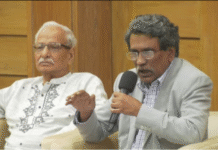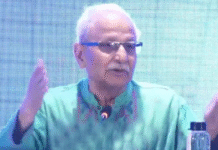After itinerant bangle vendor Taslim Ali was beaten in Madhya Pradesh, his attackers claimed he molested a child. Ali, now penurious, spent 108 days in jail before he was granted bail by the high court, which said he had no ‘criminal antecedents’. The main evidence in the police chargesheet centres around near-identical testimonies of his attackers.

Jaipur: In a chargesheet against Uttar Pradesh bangle-seller Taslim Ali, accused of child molestation, forgery, cheating in Indore, Madhya Pradesh, the police quote six witnesses, four of whom attacked Ali in Indore in August 2021.
The attack on Ali, 25, was part of a campaign in parts of north India to economically emasculate Muslim vendors (see here, here and here).
The identical testimonies of the witnesses, stating that Ali inappropriately touched a then 12-year-old girl, are the only evidence (apart from the girl’s testimony) provided in a chargesheet filed by the Madhya Pradesh police. Her testimony is the same as theirs.
Ali–whose family is now penurious from his incarceration and legal battles–was accused of a series of offences, including sexual crimes against children and criminal intimidation, after an FIR (first information report) was registered based on a complaint by the minor daughter of one of the accused.
Of the six people who claimed to be witnesses and whose testimonies form a part of the chargesheet, four were arrested for allegedly attacking Ali and were granted bail a month later.
The home minister of Madhya Pradesh, Narottam Mishra, accused Ali of posing as Hindu, which, even if true, was no crime.
All six witnesses identify themselves as family members or friends of the father of the girl, who himself was arrested for attacking Ali when the latter had gone to his house to sell bangles.
Ali’s family maintained that he was attacked because he was a Muslim. A video of the incident had gone viral on social media.
Ali spent 108 days in an Indore jail after he was beaten on 22 August, before he was finally granted bail on 7 December by the Indore bench of the Madhya Pradesh high court, which held he had no “criminal antecedents” and posed no threat to witnesses.
The FIR against Ali was lodged in another police station, about 24 hours after the bangle seller had registered the FIR related to the assault. While Ali was arrested, his attackers were released on bail and later testified against Ali. Their statements formed the basis of the chargesheet filed by the police on 21 October 2021.
A Case Built On A ID Card With Differing Names
Apart from the girl’s statement that she was touched inappropriately, the chargesheet says Ali had two Aadhar cards and a half-burnt voter ID card with different names of himself and his father. The Aadhar is a 12-digit unique identity number for Indian residents.
According to the testimonies of the witnesses mentioned in the chargesheet, Ali visited the house of the victim on the afternoon of 22 August and when asked about his identity, identified himself by a Hindu name. “When we asked his name, he said that he is Golu, son of Mohan Singh, and also showed his half-burnt voter ID card,” read the chargesheet.
The alleged victim, now 13, said in her testimony that when her mother went inside to bring money, Ali had held her hand inappropriately, on the pretext of making her wear a bangle.
“Vahi vyakti mujh se bola ki laao tumhe choodi pehna deta hoon aur aisa keh kar mera hath buri niyat se pakad kar sehlane laga phir mujh se bola ki tum kitni sundar ho aur mere gaal par buri niyat se hath pherne laga (The same person told me, come I will help you wear a bangle and then after saying this, he held my hand with bad intentions and then said, you are very pretty and started caressing my cheek with bad intentions),” she said in the testimony, adding that her mother and neighbours rushed to confront Ali after she shouted for help.
Ali threatened to kill them and started to flee when he was caught by those present, the girl added in her testimony. She said that she was not aware of what happened to Ali after he was caught.
All testimonies mention multiple times that two Aadhar cards were found in Ali’s bag. On one of the cards, his name was mentioned as Aslim, son of Mor Singh while in the other his name was written as Taslim, son of Mohar Ali. But the Aadhar number on both cards is the same. In the half-burnt voter ID, his father’s name is Mohan Singh, says the chargesheet.
Ali’s family has pointed out that the FIR against him was registered only after Ali lodged an FIR against the unknown attackers. They said the FIR against Ali was lodged by the girl’s family to counter the case registered by the salesman that led to the arrest of the girl’s father.
In the chargesheet, the family of the girl said the 24-hour delay in registering the FIR was because the girl was scared of being shamed. Yet, home minister Mishra referred to the alleged molestation seven hours after the attack on Ali.
“Because the girl is young and was very afraid after that day’s event, we didn’t come forward to report the incident; but on the second day, a false rumour was circulated that we attacked (Taslim) and took away his money, although we were only angry about the incident with the girl and had tried to scare him but… he gave a report against us,” said the girl’s father in his testimony. “After this, to tell the truth about why the dispute took place with Taslim alias Bhura alias Golu, a report on behalf of (the girl) was submitted in the police station.”
In the chargesheet, the police said that upon verifying Ali’s address in Uttar Pradesh, “it was found that he used identity cards with different names for different purposes”.
The police accused Ali of changing his name in the Aadhar card to get benefits of the Pradhan Mantri Aawas Yojana, a programme for subsidised housing.
The police said the “accused changed his name and despite being a Muslim himself gave a Hindu name and to convince the victim of her mother with that name, he showed his half-burnt voter ID card and cheated (sic).”
“In this way, the accused with his multiple names and by showing his half-burnt documents, schemed to molest the victim, who is a minor,” the police chargesheet said. The three names listed in the chargesheet are: Asleem, son of Morsingh, and Taslim, son of Mohar Ali, mentioned in two Aadhar cards; and in the half-burnt election card, his father’s name was Mohan Singh.
The police said they had found the sequence of events to be accurate and charged Ali under all the sections mentioned in the FIR against him. “Whatever we found in the investigation, we have mentioned that in the chargesheet,” Nidhi Mittal, investigating officer, told Article 14.
Case Against Ali: 9 Sections Of 2 Laws
Ali was charged under sections 354 (assault or criminal force to woman with intent to outrage her modesty), 354A (sexual harassment and punishment for sexual harassment), 467 (forgery of valuable security, will, etc.), 468 (forgery for purpose of cheating), 471 (using as genuine a forged document or electronic record), 420 (cheating and dishonestly inducing delivery of property), 506 (punishment for criminal intimidation) of the Indian Penal Code 1860, and section 7 and section 8 of the Protection of Children from Sexual Offences Act 2012.
“He did have two Aadhar cards, because he had applied for the second one in which he wanted his correct name written,” Ali’s lawyer Ehtesham Hashmi, who represented Ali pro bono, told Article 14. “Both Aadhar cards have the same number. The police have not cited any witness from the UID department or the Election Commission of India. Who will decide if the Aadhar is forged?”
“There has been a violation of life and personal liberty and misuse of police powers and criminal law–it is a violation of Article 21,” said Hashmi. “The arrest has also been illegal, as the police have not given him a lawyer or informed the family.”
Delay In Bail Hearings
It took 10 hearings between 4 October and 7 December for the MP High Court to grant Ali bail. The matter was adjourned over procedural delays such as the absence of the case diary, the lack of documents and the shortage of time. A district court had rejected Ali’s bail petition on 1 September, after which the matter reached the high court.
“The nature of accusation is not such which leads to a conclusion that (the) applicant should remain in custody till (the) decision of the matter. No criminal antecedents of the applicant could be shown to this court,” a single-member bench of Justice Sujoy Paul said.
“There is no material to show that the applicant was instrumental in threatening the person or complainants,” said Justice Paul. “Considering the nature of the accusation and in absence of any criminal record, I deem it proper to enlarge the applicant on bail.”
The government counsel argued that Ali flee if granted bail. Justice Paul, however, observed: “This FIR shows the prosecution has already reached the permanent residence of the applicant. Thus, the question of the applicant fleeing from justice does not arise.”
“Several ministers and leaders tried to delay his bail and impede the judicial process. But the bail judgement is the victory of the judiciary,” said Hashmi, his lawyer. “My client has suffered and so has his family.”
Taslim Is A Hardworking Man, Says Village Head
While Ali was in jail, his wife and their five children, the youngest two years old, turned to relatives and friends for food, while two of his six brothers, Jamal and Salman, went to Indore and sought help for Ali’s bail.
Ali also has three sisters—two married, the third unmarried. Ali, Jamal and Salman’s earnings from selling bangles keep the family afloat.
His village, Biraj Mou, 30 km north of the UP city of Hardoi, anxiously awaited his return, tracking every move in the case. Taslim’s arrest shook the village.
“His arrest put the entire village in fear,” a neighbour called Saddam told Article 14. “Now that he has got bail, the other bangle sellers who were scared to move out to various cities will start stepping out.” ,
Village pradhan or chief Bangey said Ali was “a sincere and a hardworking person”, who, like others in this village of bangle-sellers, sold their wares in various cities. Bangey said other bangle vendors of the village had also suffered: Article 14 reported in October how they were too scared to travel during the festive season.
Relieved at Ali’s return, the village exchanged sweets and “his family invited neighbours home for biryani”, Bangey said.
“It is clear Ali was beaten up over his religion, as he reported in police station Banganga after which the culprits filed a false case against him by tutoring a minor girl,” said Bhopal-based lawyer Deepak Bundele, who added that an application has now been moved “to quash the false case against him”.
Another lawyer, Jwalant Singh Chouhan, spoke of the need for more lawyers like Ali’s counsel Ehtesham Hashmi. “Hashmi has boldly protected the interest of the innocent, bearing the expenses himself,” said Chouhan, who added that the high court bail order “restored faith in the judiciary, whose biggest power is people’s trust in it”.
‘I Have Been Framed’
“I do not remember meeting a girl in that house where I was attacked. I had simply gone there to sell bangles,” Ali told Article 14 after release from jail. “They asked my religion and started abusing and hitting me once they realised I was Muslim.”
“How could I molest a girl when no girl was there? I am father to two little daughters,” said Ali, fretting about the impact of his case on his family’s social standing. “I am scared because I have a family to feed. My wife and children won’t survive without me.”
“Every day in jail, I would remember my old parents. I have responsibilities to fulfil. I also have a younger sister whose marriage is my responsibility. This episode has not only financially but also socially tarnished our image,” said Ali.
“We are not only economically shattered but socially too,” his brother Salman said.
Ali’s mother’s health took a hit with her son in jail. “I had lost all hope that I would meet my son again. His children would ask, ‘Dadi papa kab aayenge?’ (Grandma, when will father return?),” said his mother Rayeesa. “I had no reply. My prayers have been answered. I had collapsed several times, and so had his wife in the last four months.”
Family and village may be relieved to have him back, but Ali is aware he faces a long legal battle.
“My brothers were in Indore all this while. Living away from home with no income has been very difficult,” said Ali. “Even back home, my wife and parents had to turn to relatives for funds. My two brothers and I are the breadwinners. And since August none of us has been able to earn. All our savings are exhausted.”
(Tabeenah Anjum is a journalist based in Rajasthan, reporting on politics, gender, human rights, and issues that impact marginalised communities.)









